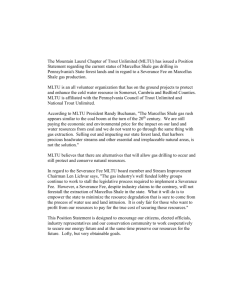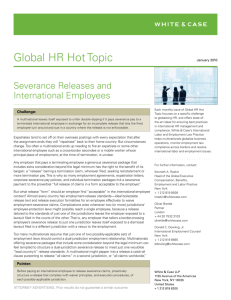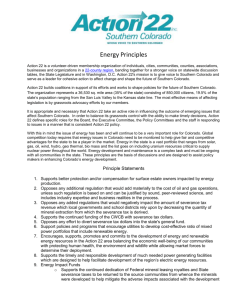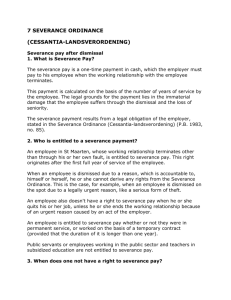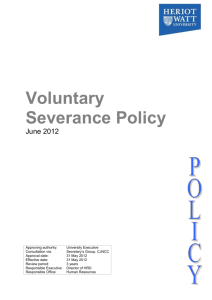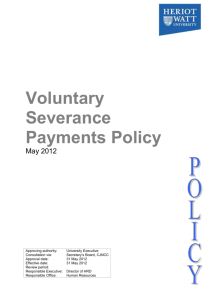sseevveerraannccee ppaayy llaaww,, 55772233-
advertisement
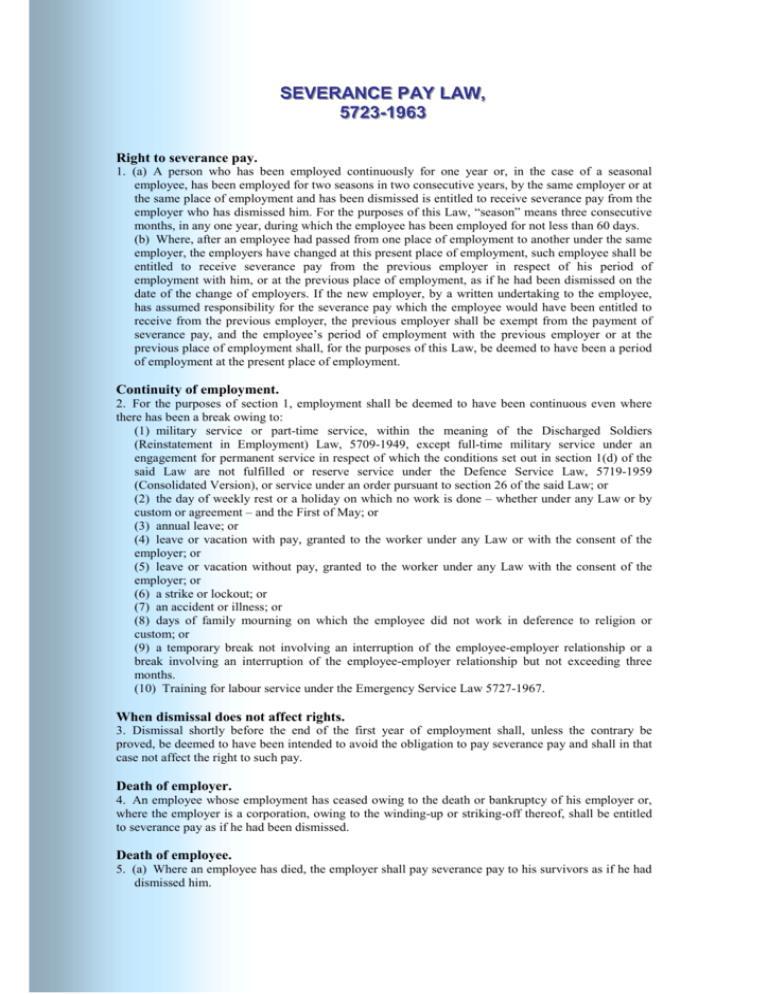
S SE EV VE ER RA AN NC CE EP PA AY Y LLA AW W,, 55772233--11996633 Right to severance pay. 1. (a) A person who has been employed continuously for one year or, in the case of a seasonal employee, has been employed for two seasons in two consecutive years, by the same employer or at the same place of employment and has been dismissed is entitled to receive severance pay from the employer who has dismissed him. For the purposes of this Law, “season” means three consecutive months, in any one year, during which the employee has been employed for not less than 60 days. (b) Where, after an employee had passed from one place of employment to another under the same employer, the employers have changed at this present place of employment, such employee shall be entitled to receive severance pay from the previous employer in respect of his period of employment with him, or at the previous place of employment, as if he had been dismissed on the date of the change of employers. If the new employer, by a written undertaking to the employee, has assumed responsibility for the severance pay which the employee would have been entitled to receive from the previous employer, the previous employer shall be exempt from the payment of severance pay, and the employee’s period of employment with the previous employer or at the previous place of employment shall, for the purposes of this Law, be deemed to have been a period of employment at the present place of employment. Continuity of employment. 2. For the purposes of section 1, employment shall be deemed to have been continuous even where there has been a break owing to: (1) military service or part-time service, within the meaning of the Discharged Soldiers (Reinstatement in Employment) Law, 5709-1949, except full-time military service under an engagement for permanent service in respect of which the conditions set out in section 1(d) of the said Law are not fulfilled or reserve service under the Defence Service Law, 5719-1959 (Consolidated Version), or service under an order pursuant to section 26 of the said Law; or (2) the day of weekly rest or a holiday on which no work is done – whether under any Law or by custom or agreement – and the First of May; or (3) annual leave; or (4) leave or vacation with pay, granted to the worker under any Law or with the consent of the employer; or (5) leave or vacation without pay, granted to the worker under any Law with the consent of the employer; or (6) a strike or lockout; or (7) an accident or illness; or (8) days of family mourning on which the employee did not work in deference to religion or custom; or (9) a temporary break not involving an interruption of the employee-employer relationship or a break involving an interruption of the employee-employer relationship but not exceeding three months. (10) Training for labour service under the Emergency Service Law 5727-1967. When dismissal does not affect rights. 3. Dismissal shortly before the end of the first year of employment shall, unless the contrary be proved, be deemed to have been intended to avoid the obligation to pay severance pay and shall in that case not affect the right to such pay. Death of employer. 4. An employee whose employment has ceased owing to the death or bankruptcy of his employer or, where the employer is a corporation, owing to the winding-up or striking-off thereof, shall be entitled to severance pay as if he had been dismissed. Death of employee. 5. (a) Where an employee has died, the employer shall pay severance pay to his survivors as if he had dismissed him. For the purpose of the above provision, “survivors” means a spouse of the employee at the time of the employee’s death, including a person known among the public as the spouse of, and living with, the employee, and a child of the employee coming within the definition of a dependent of an insured person for the purposes of benefits under Chapter Three of the National Insurance Law (Consolidated Version), 5728-1968, or, where there is not a spouse or child as aforesaid, such children and parents as were mainly supported by the deceased, and such brothers and sisters as had been living at the house of the deceased for not less than twelve months prior to his death and had been wholly supported by him. (b) Where severance pay is payable to survivors, other than a spouse or dependent children as aforesaid, it shall be deposited with the Regional Labour Court and shall be paid out to such survivors, and according to such apportionment as the Regional Labour Court may determine, having regard to the economic situation of the survivors and to the extent of their dependence on the deceased. (c) Severance pay payable to survivors of a deceased employee shall not be regarded as part of the estate. Resignation by reason of ill-health. 6. Where an employee resigns by reason of his state of health or the state of health of a member of his family and, in view of the medical findings a, the conditions of employment and the other circumstances of the case, there is a sufficient reason for the resignation, the resignation shall, for the purposes of severance pay be deemed to be dismissal. In this section, “member of family” means such a member of the family as has been designated by regulations with the approval of the Knesset Labour and Social Affairs Committee. Resignation of parent. 7. (a) Where a woman resigns from her employment, within nine months after giving birth, in order to take care of her child, her resignation shall for the purposes of this Law, be deemed to be dismissal. The same shall apply to a woman who, either alone or jointly with her husband, had received a child under thirteen years of age for adoption and who resigns, within nine months from receiving the child for adoption in order to take care of him, provided that an adoption order is made either before or after the resignation. (b) The provisions of subsection (a) shall apply, mutatis mutandis, to a male employee if he meets one of the following requirements: (1) his spouse was an employee for at least six consecutive months immediately before the date of his resignation; for this purpose, a period of discontinuance of employment in which the employee-employer relationship continued shall also be regarded as a period of employment; (2) he has sole custody or charge of the child owing to invalidity or illness of his spouse; (3) the employees spouse was a self employed woman for a period of at least 12 consecutive months immediately prior to the birth of or immediately before the child was received for adoption, as the case may be and she did not cease her employment in order to care for the child. (c) Where one of the spouses has resigned as specified in subsection (a) or (b), as the case may be, the provisions of this section shall not apply to the other spouse. (d) The Minister of Labour and Social Affairs shall prescribe by regulations, with the approval of the Knesset Labour and Social Affairs Committee, provisions as to the duty of delivering to the employer notices for the purposes of this section from the spouses or from one of them and as to the consequences of non-delivery of such notices. (e) The Minister of Labour and Social Affairs shall prescribe by regulations, with the approval of the Knesset Labour and Social Affairs Committee, rules concerning the definition of a self employed woman for the purposes of subsection (b)(3), and also rules on the manner of proving her occupation and ways of proving the non cessation of her employment, as provided in that subsection. Resignation by reason of transfer of residence. 8. For the purposes of this Law, the resignation of an employee shall be deemed to be dismissal if it results from the transfer of his residence (1) upon his marriage, to a locality in Israel where his spouse had been living – subject to conditions prescribed by regulations with the approval of the Knesset Labour and Social Affairs Committee; (2) to an agricultural settlement from a locality other than an agricultural settlement or to a locality in a development area from a locality other than in a development area – subject to conditions prescribed by regulations with the approval of the Knesset Labour and Social Affairs Committee; for the purposes of this paragraph, “agricultural settlement” or “”locality in a development area” means a locality belonging to a class of localities defined by regulations, with the approval of the Knesset Labour and Social Affairs Committee, as agricultural settlements or localities in a development area, as the case may be; (3) for other reasons designated by regulations, with the approval of the Knesset Labour and Social Affairs Committee, as justifying the transfer of the employee’s residence. Non-renewal of contract of employment. 9. (a) Where an employee has been employed under a contract for a specific period and that period has come to an end, he shall, for the purposes of this Law, be deemed to have been dismissed unless the employer has offered to renew the contract; if the employee refuses to renew the contract, he shall, for the purposes of this Law, be deemed to have resigned. (b) An employer’s offer to renew the contract, as referred to in subsection (a), shall be delivered to the employee not less than three months before the expiration ofd the period of the contract. Repeal of section 10. 10. Repealed. Other resignations deemed to be dismissal. 11. (a) Where an employee resigns by reasons of an appreciable deterioration of his conditions of employment, or in view of other matters of labour relations affecting him and because of which he cannot be expected to continue in his employment, the resignation shall, for the purposes of this Law, be deemed to be dismissal. (b) Where a seasonal employee, after being employed at the same place of employment for not less than three consecutive seasons, resigns because continuous seasonal employment at that place of employment has not been assured to him, he shall be deemed to have been dismissed. (c) Where immediately before his enlistment for regular service within the meaning of section 1 of the Discharged Soldiers (Reinstatement in Employment) Law, 5709-1949, an employee resigns by reason of his enlistment as aforesaid, the resignation shall for the purposes of this Law be regarded as dismissal. The same applies to a female employee who resigned shortly before volunteering for National Service, within the meaning thereof in paragraph 3(b) of the definition of “child” in section 5 of the National Insurance Law (Consolidated Version) 5728-1968, provided that she serves at least 6 months in National Service. (d) Where an employee resigns because he has been elected head or deputy head of a local authority, and he is in that capacity paid a salary from the fund thereof, his resignation shall for the purposes of this Law be deemed to be dismissal. This provision shall not apply if the employer has agreed in writing vis-a-vis the employee that the period of his service in the said capacity shall be regarded as a period of leave without pay. Compensation to person who enlists in the Police. 11A. Where a person enlists in the Israel Police of the Prison Service who immediately before so enlisting was an employee and resigned from his employment in order to enlist as aforesaid, he or his survivors shall be entitled to severance pay if – (1) he serves with the Police or the Prison Service for a period of at least six months, or (2) his service as aforesaid is discontinued on one of the grounds entitling him to severance pay under this Law, or (3) his service as aforesaid is discontinued because he is found unsuitable for service, provided it is not discontinued under circumstances which would not entitle him to severance pay from the Police or the Prison Service, as the case may be. This Law shall only apply to a person who resigns from his employment after the coming into force of this Law. Rate of severance pay. 12. (a) The rate of severance pay shall be: in the case of a salaried employee who has been employed by the same employer or at the same place of employment, a month’s wages per year of employment, and in the case of a wage worker as aforesaid, two weeks’ wages per year of employment. A fraction of a year following a year of employment shall entitle the employee to proportionate severance pay; in the case of a seasonal employee, a fraction of a year shall entitle him to proportionate severance pay even if the periods of employment do not add up to a year. For the present purpose, “salaried employee” means an employee the remuneration for whose work is mainly paid on the basis of a month or for longer period, and “wage-worker” means an employee other than a salaried employee. (b) The Minister of Labour and Social Affairs may, after consultation with the Minister of Finance and with the approval of the Knesset Labour and Social Affairs Committee, increase, by regulations the rate of the severance pay of a wage worker. Regulations as aforesaid may be general or for specific branches of employment. (NOTE: Effective August 1, 1983, regulations changed this provision so that the rate of severance pay for all employees became one month’s wage per year of employment). Calculation of wage. 13. The Minister of Labour and Social Affairs, with the approval of the Knesset Labour and Social Affairs Committee, shall determine by regulations, generally or in respect of particular classes, such components of the total wage as shall be taken into account for the purposes of severance pay; the methods of calculating the wage on which the calculation of severance pay is to be based; and such breaks in employment under the circumstances mentioned in paragraph (1) - except reserve service and service under an order pursuant to section 26 of the Defence Service Law, 5719-1959 (Consolidated Version) - (5), (7), or (9) of section 2 as shall not be taken into account in fixing the amount of severance pay. In making those regulations, the Minister of Labour and Social Affairs shall have regard to the relevant provisions of the collective agreement applying to the greatest number of employees to which the regulations relate. Calculation of severance pay where wage temporarily reduced. 13A. Where a collective agreement provides that the wage of the employees shall be reduced temporarily or for a specific period only prescribed therein, as against the wage to which they would otherwise have been entitled, the, for the purpose of calculating the severance pay of an employee to whom the agreement applies, the wage shall be deemed not to have been reduced. For this purpose, "collective agreement" includes a collective arrangement. Calculation of severance pay according to minimum wage. 13B. Notwithstanding the provisions of Section 13, the wage to be taken into account for calculation of severance pay shall not be less than the amount of the minimal wage, as defined in Section 1 of the Minimum Wage Law 5747-1987, according to the scope of the position held. Severance pay and provident funds. 14. A payment to a provident fund, pension fund or any other similar fund shall not serve in lieu of severance pay except if and in so far as such is provided in the collective agreement applying to the employer and the employee or if and in so far as such payment has been approved by the Minister of Labour and Social Affairs by order. Severance pay and retirement benefit. 15. Where an employee or his survivor is entitled under any enactment to a benefit from the employer in consequence of the retirement of the employee from employment or for any other reason, such benefit shall serve in lieu of severance pay under this Law. Dismissal without severance pay by virtue of collective agreement. 16. An employee shall not be entitled to severance pay, or shall be entitled to partial severance pay only, as the case may be, if he is dismissed under circumstances which, under a collective agreement applying to the employer and the employee or, in the absence of such an agreement, under a collective agreement applying to the greatest number of employees in that branch of employment, justify dismissal without severance pay or with partial severance pay only. Dismissal without severance pay by virtue of judgment. 17. In a branch of employment in which there is no collective agreement, the Regional Court may rule that the dismissal of an employee occurred in circumstances justifying dismissal without severance pay, or with such partial severance pay as it shall determine; in dealing with such a matter the Regional Court shall be guided by the rules contained in the collective agreement applying to the greatest number of employees. Certificate. 18 A certificate by the Minister of Labour and Social Affairs, or by a person empowered by him in that behalf, to the effect that a particular collective agreement applies to a particular employer and a particular employee or to the greatest number of employees in a particular branch of unemployment or the greatest number of employees, as the case may be, shall be conclusive evidence for the purpose of sections 16 and 17. Priority of reinstatement in employment and severance pay. 19. Where an employee has been dismissed by reason of a reduction of the volume of employment at the undertaking, and the right of priority of reinstatement in employment at the undertaking, within a specific period, has been assured to him, the provisions of the collective agreement applying to the employee and the employer or, in the absence of a collective agreement in the matter, the provisions of a special agreement between those entitled to be parties to a collective agreement shall apply to everything relative to severance pay, so long as the agreement in question does not contain a permanent waiver of severance pay. Collective agreement ensuring accumulation of severance pay. 20. A collective agreement may prescribe the modes and methods of paying severance pay, including the deposit thereof in favour of the employee with a view to ensuring the accumulation thereof in his favour; and where those matters have been prescribed as aforesaid, severance pay shall be paid in accordance with the agreement. Deposit order. 21. The Minister of Labour and Social Affairs, after consultation with the Minister of Finance and with the approval of the Knesset Labour and Social Affairs Committee, may direct employers, by order, to deposit in a benefit fund within the meaning of section 47 of the Income Tax Ordinance (hereinafter referred to as "benefit fund") amounts at a rate prescribed in the order, with a view to ensuring the accumulation of the severance pay which employers are likely to have to pay to their employees under this Law (an order as aforesaid is hereinafter referred to as a "deposit order"). Classes of employers. 22. A deposit order, which shall be published in Reshumot, shall indicate the classes of employers to which it relates - by branches of the economy of the size of the undertakings, or by regions - and the date of its coming into force, which shall not be prior to the date of publication. Regulations as to moneys deposited. 23. The Minister of Labour and Social Affairs may, with the approval of the Knesset Labour and Social Affairs Committee, enact, by regulations, provisions as to the following matters (save insofar as other provisions have been enacted by rules made under section 47 of the Income Tax Ordinance): (1) the mode of investing moneys deposited under a deposit order; (2) the mode of paying severance pay to employees in whose favour moneys have been deposited under a deposit order, and the procedure to be followed in that connection; (3) the disposal of moneys deposited under a deposit order in a benefit fund whose approval under section 47 of the Income Tax Ordinance has expired or been withdrawn or which has been wound up or struck off; (4) the increase of the amounts to be deposited under a deposit order in the event of delay, and the rate of the increase. Collection. 24. (a) The Taxes (Collection) Ordinance - except section 12 thereof - shall apply to the collection of moneys to be deposited under a deposit order, as they were a tax under the said Ordinance. (b) The Minister of Labour and Social Affairs may appoint a person who shall have the powers of a District Commissioner and a District Officer under the said Ordinance and who shall, for the purposes of this section, exercise the functions assigned to a District Commissioner and a District Officer. Time for deposit. 25. Amounts to be deposited under a deposit order shall be deposited within 42 days after the payment of the wage for the period of employment in question; the Minister of Labour and Social Affairs or a person empowered by him in that behalf may extend the time to a period not exceeding three months. Safeguarded amounts. 26. (a) Amounts paid in lieu of severance pay under section 14 or deposited under section 20 or 21, or paid into a benefit fund for the payment of severance pay (1) cannot be returned, transferred, charged or attached; this provision shall not apply to an amount paid or deposited as aforesaid in respect of an employee who has meanwhile ceased to work under circumstances not entitling him to severance pay, unless the amount is intended also for pension insurance and it is not stipulated in a collective or other agreement that it can be returned or transferred; (2) are not part of the assets of the employer in the event of death, bankruptcy or windingup in so far as the claims of the employees under this law have not been met. (b) The provisions of this section shall apply also to interest and linkage differentials added to amounts as aforesaid. Priority. 27. For the purposes of debts the discharge of which, according to Bankruptcy Ordinance, 1936, or the Companies Ordinance, takes precedence over the discharge of all other debts, severance pay shall be deemed to be wages payable in precedence to all other debts, but the amount of severance pay and wages paid as aforesaid shall not in the aggregate exceed 150 percent of the maximum amount of wages which may be paid in precedence to all other debts under the said Ordinances; severance pay shall also be one of the debts the discharge of which takes precedence over all other debts upon the winding-up of a cooperative society or society under Ottoman Law. Wages including severance pay. 28. An agreement between an employer and an employee which specifies that severance pay is included in the wages and which has been approved by the Minister of Labour and Social Affairs or a person empowered by him in that behalf shall, for the purposes of severance pay, replace the provisions of this Law unless there is a collective agreement applying to the employer and the employee requiring the payment of severance pay. Composition and acknowledgment of discharge. 29. A composition as to severance pay and an acknowledgment of discharge shall not be valid unless they are drawn up in writing and state expressly that they relate to severance pay. The State as an employer. 30. (a) The State as an employer shall, for the purpose of this Law, have the status of any other employer. (b) In respect of a member of the Police Force or the Prison Service, including a temporary additional warder (1) sections 2(6), 8 and 17 shall no apply; (2) section 3 shall not apply to dismissal under section 9 of the Police Ordinance or section 16 of the Prisons Ordinance, 1946. (3) a change in the conditions of employment shall not be regarded as an appreciable deterioration of the conditions of employment, within the meaning of section 11, if it was introduced by virtue of a power under the Police Ordinance, the Prisons Ordinance, 1946, or any regulations made under either of them, or under the Police Service Rules or the Prison Service Rules, as the case may be; (4) the reference in section 16 to a collective agreement applying to the employer and the employee shall be deemed to be reference to the reference to the Police Service Rules or the Prison Service Rules, as the case may be. Saving of rights. 31. This Law shall not derogate from any right granted to an employee by any Law, collective agreement, contract of employment or - for the purposes of section 12 - by custom and shall not, in any negotiations as to rights in connection with retirement from employment, be construed as dealing exhaustively with the rights of an employee. Duty of consultation. 32. The Minister of Labour and Social Affairs shall make regulations only after consultation with the employees' organisation representing the greatest number of employees in Israel and with representative national organisations of employers which, in the opinion of the Minister, are concerned in the matter. Implementation and regulations. 33. The Minister of Labour and Social Affairs is charged with the implementation of this Law and may make regulations as to any matter relating to such implementation. Commencement. 34. This Law shall come into force on the 16th Tevet, 5724 (1st January, 1964).

